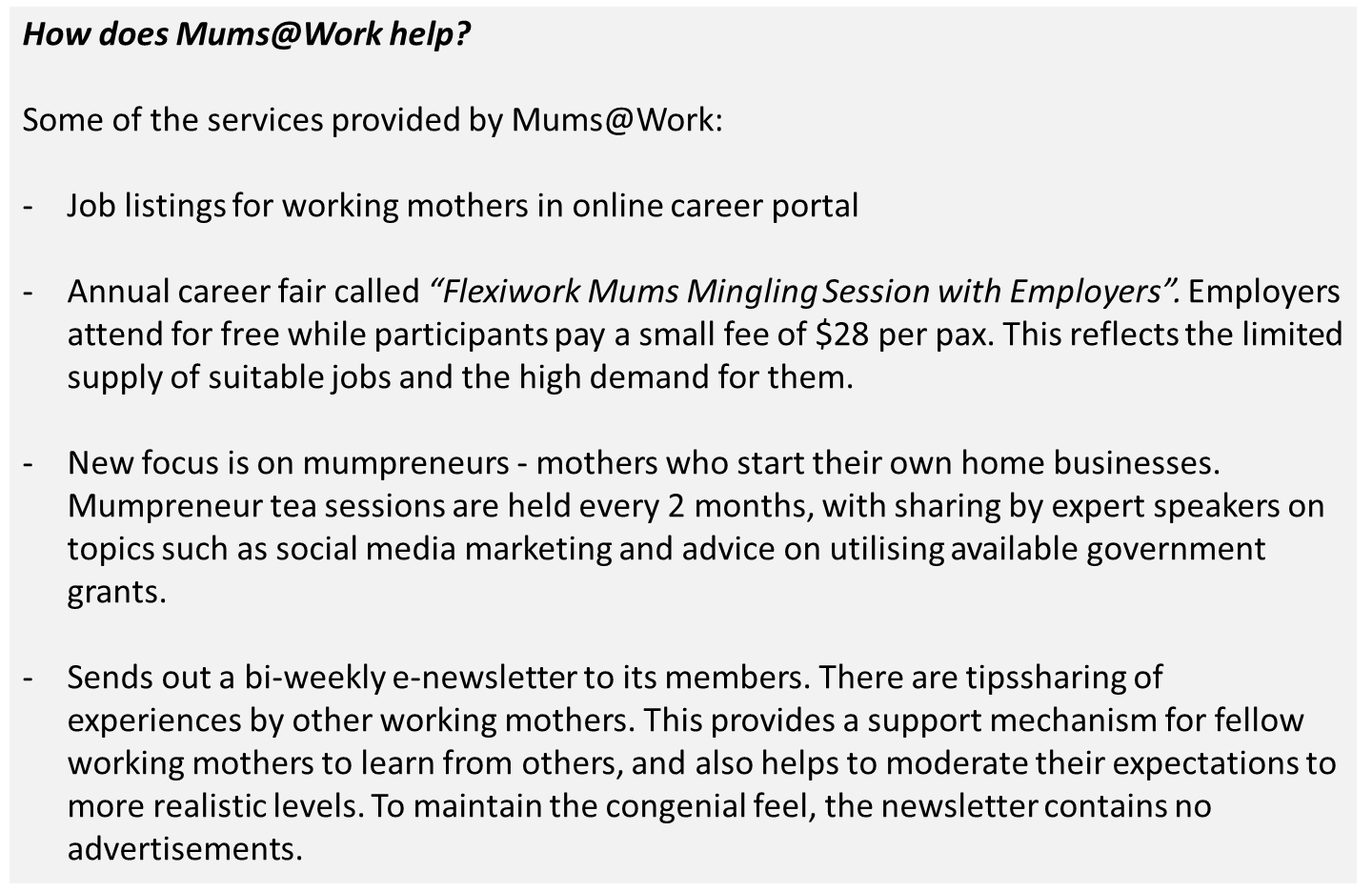Sher-Li Torrey is the founder and director of Mums@Work, billed as the only Singapore-based online career portal for working mothers.
This social enterprise is known for its job listings and events, which help to set up employers with a pool of carefully screened candidates. In three short years, it has chalked up more than 10,000 registered members and employs three working mothers. Over 1,100 job positions have been listed to date, with an estimated successful placement rate of more than 70%.
Sher-Li also spends her time helping companies implement policies – especially on flexible work arrangements- to better attract and retain working mothers. HQ Asia speaks to Sher-Li to uncover tips for companies keen to leverage this under-utilized talent pool.
Growing interest from employers
The call for employers to facilitate a switch from conventional job hours to flexible working arrangements has gathered pace over the past decade. This issue is significantly important, especially for female employees who are starting their own families. These wives-and-mothers-to-be are confronted with the challenge of juggling work and family, and have seen many predecessors quit their jobs to focus on being housewives.
In a 2003 study, 26% of US female business leaders felt that a "commitment to personal/family responsibilities" represented a significant barrier to women's overall career advancement, an increase from 18% in 1996. On the other side of the Atlantic, 4 out of every 10 working mothers in UK in a National Childbirth Trust (NCT) survey rated their return to work after childbirth as “difficult” or “very difficult”.
In Asia, some 60% of Korean females reported “child rearing as the biggest obstacle to participating in the labour force”. Many Asian countries also do not rank highly on the World Economic Forum’s Gender Equality Index, which takes into account the opportunities afforded to women in the workforce and percentage of females in leadership position, among other factors.
Such conditions undoubtedly contribute to a brain-drain of female talent from organisations. The longer female workers are awayfor , the more ground they have to make up when they seek a return to the workforce. The resultant outdating of skill sets and weakening of social networks often persist for years after their return and can damage career prospects. In the same survey, 88% of working mothers indicated a preference for flexible work arrangements (FWA) to be introduced so as to help them cope with the dual-roles of employee and housekeeper.
Employers should also be aware of the financial benefits of retaining working mothers. In many cases, it would actually be more cost-effective to tailor a job role to suit the needs of a working mother than to hire a new replacement. Diversity has also been shown to increase the effectiveness of research, development, innovation, and ultimately, profits. Many companies are scrambling to add women members to their boards. Twitter has just appointed their first female board member to a previously all-male, all-white ensemble. Such diversity efforts also appeal to female customers who now wield growing purchasing influence and power, with some estimates that women are expected to control an astounding $28 trillion in consumer spending by 2014. There is an increasing acknowledgement that “employee commitment and customer loyalty will be influenced by gender parity in key decision-making roles”.
In Asia, some 60% of Korean females reported “child rearing as the biggest obstacle to participating in the labour force”.
Helping working mothers one company at a time
According to a 2013 poll in Singapore, only 32% of respondents report that their employers are supportive of flexible work arrangements. Yet even when top management are advocates for FWA, companies often lack the relevant experience and expertise to execute FWA policies. This is one area that Mums@Work can render assistance. They provide training and consulting services for the organisations, and advise on the changes needed to support working mothers.
According to Sher-Li, one key challenge for Mums@Work is winning the support of line managers. Even if senior management gives the green light, it is up to the line managers to make the necessary work arrangements for their workers. The understanding of fellow team members is also important. Resentment is not uncommon when working mothers get off work earlier. The fact that these working mothers are correspondingly paid less is often overlooked.
Implementing flexible working arrangements is not a straightforward task that can be accomplished in isolation. It has to involve the entire organization. Systems and processes have to be put into place, especially for performance management. For example, how do managers track the work progress of mothers who work from home? Would being physically absent unfairly penalise them in any way?
Sher-Li suggests that there is one potent way to signal to the entire company that FWAs are to be taken seriously: including support for FWA as a key performance indicator (KPI) for supervisors. Line managers will then understand that a key part of their job involves creating and supporting an environment where FWA can thrive.
The rapid pace of technological advancement can become an enabler for even smaller companies to adopt FWA - tools like free video-conferencing software can allow for productive collaborations even from remote locations. Unfortunately, the culture in many organisations has not kept pace with technological advancement. This is where the inclusion of FWA support as part of supervisor KPI might work. Supervisors could definitely help to shape the cultures and attitudes of their team members.
Not all jobs, however, are suited for flexible working arrangements. This includes roles which demand high levels of “face time”, such as client-facing roles or the management of large teams. Mums@Work also counsels working mothers to calibrate their expectations. Many senior job roles have heavy responsibilities and demand fast turnaround times, in which case a part-time arrangement could be impractical. One suggestion is for working mothers to adjust to less-demanding job roles (e.g. from a CFO to a finance manager), or a similar role in a smaller company.
FWA not just for working mothers
Working mothers are not the only talent pool that FWA has a special appeal for. The physically disabled and the elderly are other groups that would likely appreciate FWA. Many Gen Y graduates entering the labour market are also demanding better work-life balance. They are no longer willing to sacrifice their personal leisure at the altar of their careers. FWA might allow them the freedom to run a social enterprise on the side, volunteer for meaningful causes, pursue a hobby – activities that might actually increase their engagement levels and indirectly develop them to be better workers.
The needs of people have evolved much more quickly than the jobs have, and there is much catching up to do. People are often the most important assets for companies, so it makes great business sense to adjust to employees’ changing needs. Beyond FWA, companies need to start re-looking at how they engage and energise their talent. As the mindsets of people change, organisations need to similarly reevaluate their mindset regarding work arrangements.



